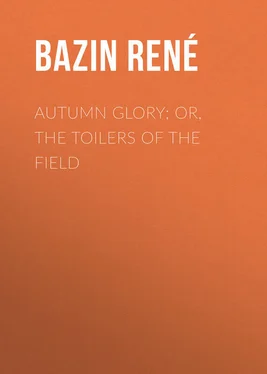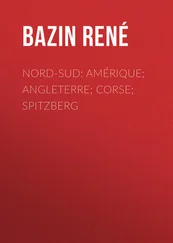René Bazin - Autumn Glory; Or, The Toilers of the Field
Здесь есть возможность читать онлайн «René Bazin - Autumn Glory; Or, The Toilers of the Field» — ознакомительный отрывок электронной книги совершенно бесплатно, а после прочтения отрывка купить полную версию. В некоторых случаях можно слушать аудио, скачать через торрент в формате fb2 и присутствует краткое содержание. Жанр: foreign_language, foreign_antique, foreign_prose, на английском языке. Описание произведения, (предисловие) а так же отзывы посетителей доступны на портале библиотеки ЛибКат.
- Название:Autumn Glory; Or, The Toilers of the Field
- Автор:
- Жанр:
- Год:неизвестен
- ISBN:нет данных
- Рейтинг книги:3 / 5. Голосов: 1
-
Избранное:Добавить в избранное
- Отзывы:
-
Ваша оценка:
- 60
- 1
- 2
- 3
- 4
- 5
Autumn Glory; Or, The Toilers of the Field: краткое содержание, описание и аннотация
Предлагаем к чтению аннотацию, описание, краткое содержание или предисловие (зависит от того, что написал сам автор книги «Autumn Glory; Or, The Toilers of the Field»). Если вы не нашли необходимую информацию о книге — напишите в комментариях, мы постараемся отыскать её.
Autumn Glory; Or, The Toilers of the Field — читать онлайн ознакомительный отрывок
Ниже представлен текст книги, разбитый по страницам. Система сохранения места последней прочитанной страницы, позволяет с удобством читать онлайн бесплатно книгу «Autumn Glory; Or, The Toilers of the Field», без необходимости каждый раз заново искать на чём Вы остановились. Поставьте закладку, и сможете в любой момент перейти на страницу, на которой закончили чтение.
Интервал:
Закладка:
"Only try!" retorted the cripple.
The whilom farm-servant of La Fromentière began to mount the hill beside the farm; clad in his russet work-day clothes he walked with difficulty as if worn out with fatigue. His whole wardrobe, slung on to his gun, consisted of but one coat, a blouse, three shirts, a couple of boxwood bird calls for quails that clapped together as he walked, and yet the load seemed heavy. A feeling of dismay at having to go back to the daily seeking of employment had come over him while making up the modest bundle. He was already thinking of his mother's alarm at this sudden return. Every step was a wrench from some loved object, for he had lived three years in this Fromentière. His heart was heavy with memories; he walked on slowly, looking at nothing yet seeing every stick and stone. The trees he brushed past had all been pruned by him, or flicked by his whip; every inch of ground had been ploughed and reaped by him; he knew how every furrow was to be sown on the morrow.
Having reached the back of the farm, at the rise of the road where formerly four mills had been busily grinding corn and now only two were at work, he turned to look back that he might increase the pain of parting.
Below him, bathed in sunlight, lay the plain of the Marais, where rushes, taking on their autumn array, formed golden circles round the meadows; there were farms distinguishable by their groups of poplars, inhabited islands in the desert of marshland, where he was leaving good friends, and the recollection of happy hours that come back in sorrow; his eyes scanned the crowded houses of Sallertaine and its church dominating them all, recalling bygone Sundays. Then, with his soul in his eyes, he bent them upon La Fromentière, as a bird would hover with wide extended wings.
From the height on which he stood the lad could discern the whole of the farm, even to its slightest details. One by one he counted the windows, the doors and gates, the paths round the fields along which every evening, for the last two years especially, he had never failed to sing as he drove the cattle homewards. When his eyes lighted on the dwarf orchard, so distant that it looked no larger than a pea-pod, he quickly turned away; as he did so, his foot struck against something in the path, it was a dog lying down, quite still.
"What, you, Bas-Rouge?" said Jean. "My poor doggie, you cannot follow me where I am going;" and, walking on, he stroked the dog's head between his ears, in the place where Rousille loved to fondle him. After some twenty paces, he said again:
"You must go back, Bas-Rouge. I do not belong to you any more."
Bas-Rouge trotted on a little further with his friend; but when they had reached the last hedge of La Fromentière, he stopped, and turned slowly homewards.
CHAPTER IV.
THE MICHELONNES
"Rousille," said her father, as shortly before noon she went into the house to help her sister prepare dinner, "you will not take your meals with us either to-day, or for some days to come. A girl like Eléonore, who respects herself, would be ashamed to eat her food beside a young woman who could allow a penniless Boquin to make love to her. A pretty kind of lover! A fellow from I don't know where, who would not even have a wardrobe to furnish his house with! All very well for a serving-maid, such as they are in those parts; but the whole kit of them are not worth their salt in the Marais, those dannions ! I am cured of taking them into my service. There must have been some fine tales going the round at my expense. And now, Rousille, mind that you conduct yourself properly; and take yourself out of my sight!"
So the farmer spoke, far more harshly than he felt, because Mathurin had been talking to him a long time after Nesmy had gone, and had inspired him with some of his resentment.
Marie-Rose made no reply, shed no tear, but withdrew to her room. She had no thought of dinner, either with or without them; but began to dress herself in her best, as for Sunday, taking by turns from the wardrobe a black skirt, raised from the ground by a broad tuck, showing the pretty feet beneath; her most dainty coif and embroidered pyramid of muslin kept in shape by silver paper that rested on her hair; open-work stockings; sabots, like the prow of a ship, so much did they turn up. A blue silk kerchief filled in the low bodice, as was the custom in the Marais; there only remained to smooth the bands of chestnut hair with a little water, to bathe her red eyes, then going out into the courtyard she turned off on the road to Sallertaine.
For the first time in her life she had a feeling of standing alone in the world. Mathurin did not love her; François did not understand her. André himself, the soldier brother so soon coming home, who had always been kind, only treated her as a child to be teased and petted. And she felt herself a woman – a woman who was learning to know sorrow, and one who needed to pour out her trouble to sympathetic ears.
Hitherto, if they were unkind, if they neglected her, she had never felt the need of telling her troubles to anyone; the thought of Jean Nesmy had been enough to make her forget them all. But now that he whom she loved had had to go, and that his going was the sorrow, her soul cried out for aid – sought some safe place wherein to rest. In her distress she thought of the sisters Michelonne. Rousille passed close beside the dwarf orchard; Rousille skirted the edge of the Marais whence can be seen Sallertaine upon its eminence. No, she had no other hope save in those two dear old friends; no other regret than that she had not before been to that little house in the town. The old sisters' warmth of heart seemed to her just now a thing of priceless worth, which, hitherto, had not been valued half enough. The mere thought of their round faces, withered and smiling, was a goal to her. It seemed as if only to see the Michelonnes, even if she might not speak one word of her trouble, would be a consolation, because of their kind hearts, and because, old maids though they were, they were not the people to gossip about a young girl's red eyes. What excuse could she make for going to them? Oh, it was very simple. She had promised to draw out her money and lend it to her father to pay the rent. She had only to say, "I have come for my money; father needs it." Then if they guessed the slightest thing, she would tell all, all her trouble, all the grief she could not endure alone.
It was close upon one o'clock. A mist of heat quivered over the meadows. Rousille walked fast. Now she had reached the Grand Canal, smooth as a mirror; there was the bridge across it, the winding road flanked on either side by the white-washed houses of the outskirts of Sallertaine, their orchards at the back looking towards the Marais. Rousille walks faster. She is afraid of being hailed and stopped, for the Lumineaus are known to everyone in the district. But the good folks are either taking their noonday sleep, or else without quitting their shady corners they call to her, "Good day, little one! How fast you are walking!" "Yes, I am in a hurry. Sometimes one is." "Yes, indeed," they reply, and on she goes. She has reached the long open Place that narrows as it reaches the church. Now she has only eyes for the humble dwelling which stands at the extreme end where the street is narrowest, facing the side door of the church by which the faithful enter on Sundays. It is a very little house, one window looks on to the Place, the other on to a steep lane, the three steps to the entrance are at the corner; it is also very old, and built under the shadow of the clock tower, beneath the peal of bells, thus nearer to Heaven.
The sisters Michelonne have lived there all their lives. Rousille can picture them within the walls; a half smile, a ray of hope crosses her sad face. She ascends the three steps, and pauses to regain breath.
Читать дальшеИнтервал:
Закладка:
Похожие книги на «Autumn Glory; Or, The Toilers of the Field»
Представляем Вашему вниманию похожие книги на «Autumn Glory; Or, The Toilers of the Field» списком для выбора. Мы отобрали схожую по названию и смыслу литературу в надежде предоставить читателям больше вариантов отыскать новые, интересные, ещё непрочитанные произведения.
Обсуждение, отзывы о книге «Autumn Glory; Or, The Toilers of the Field» и просто собственные мнения читателей. Оставьте ваши комментарии, напишите, что Вы думаете о произведении, его смысле или главных героях. Укажите что конкретно понравилось, а что нет, и почему Вы так считаете.












